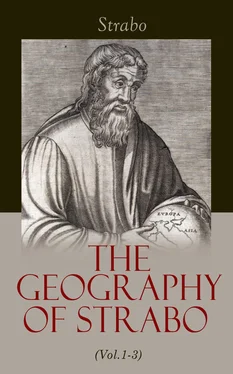CHAPTER IV.
GAUL. THE BELGÆ.
Table of Contents
1. After the nations mentioned come those of the Belgæ, who dwell next the ocean. Of their number are the Veneti, 1474who fought a naval battle with Cæsar. They had prepared to resist his passage into Britain, being possessed of the commerce [of that island] themselves. But Cæsar easily gained the victory, not however by means of his beaks, (for their ships were constructed of solid wood,) 1475but whenever their ships were borne near to his by the wind, the Romans rent the sails by means of scythes fixed on long handles: 1476for the sails [of their ships] are made of leather to resist the violence of the winds, and managed by chains instead of cables. They construct their vessels with broad bottoms and high poops and prows, on account of the tides. They are built of the wood of the oak, of which there is abundance. On this account, instead of fitting the planks close together, they leave interstices between them; these they fill with sea-weed to prevent the wood from drying up in dock for want of moisture; for the sea-weed is damp by nature, but the oak dry and arid. In my opinion these Veneti were the founders of the Veneti in the Adriatic, for almost all the other Keltic nations in Italy have passed over from the country beyond the Alps, as for instance, the Boii 1477and Senones. 1478They are said to be Paphlagonians merely on account of a similarity of name. However, I do not maintain my opinion positively; for in these matters probability is quite sufficient. The Osismii are the people whom Pytheas calls Ostimii; they dwell on a promontory which projects considerably into the ocean, but not so far as Pytheas and those who follow him assert. 1479As for the nations between the Seine and the Loire, some are contiguous to the Sequani, others to the Arverni.
2. The entire race which now goes by the name of Gallic, or Galatic, 1480is warlike, passionate, and always ready for fighting, but otherwise simple and not malicious. If irritated, they rush in crowds to the conflict, openly and without any circumspection; and thus are easily vanquished by those who employ stratagem. For any one may exasperate them when, where, and under whatever pretext he pleases; he will [Pg 292] [CAS. 196] always find them ready for danger, with nothing to support them except their violence and daring. Nevertheless they may be easily persuaded to devote themselves to any thing useful, and have thus engaged both in science and letters. Their power consists both in the size of their bodies and also in their numbers. Their frankness and simplicity lead them easily to assemble in masses, each one feeling indignant at what appears injustice to his neighbour. At the present time indeed they are all at peace, being in subjection and living under the command of the Romans, who have subdued them; but we have described their customs as we understand they existed in former times, and as they still exist amongst the Germans. These two nations, both by nature and in their form of government, are similar and related to each other. Their countries border on each other, being separated by the river Rhine, and are for the most part similar. Germany, however, is more to the north, if we compare together the southern and northern parts of the two countries respectively. Thus it is that they can so easily change their abode. They march in crowds in one collected army, or rather remove with all their families, whenever they are ejected by a more powerful force. They were subdued by the Romans much more easily than the Iberians; for they began to wage war with these latter first, and ceased last, having in the mean time conquered the whole of the nations situated between the Rhine and the mountains of the Pyrenees. For these fighting in crowds and vast numbers, were overthrown in crowds, whereas the Iberians kept themselves in reserve, and broke up the war into a series of petty engagements, showing themselves in different bands, sometimes here, sometimes there, like banditti. All the Gauls are warriors by nature, but they fight better on horseback than on foot, and the flower of the Roman cavalry is drawn from their number. The most valiant of them dwell towards the north and next the ocean.
3. Of these they say that the Belgæ are the bravest. They are divided into fifteen nations, and dwell near the ocean between the Rhine and the Loire, and have therefore sustained themselves single-handed against the incursions of the Germans, the Cimbri, 1481and the Teutons. The bravest of the Belgæ are the Bellovaci, 1482and after them the Suessiones. The amount of their population may be estimated by the fact that formerly there were said to be 300,000 Belgæ capable of bearing arms. 1483The numbers of the Helvetii, the Arverni, and their allies, have already been mentioned. All this is a proof both of the amount of the population [of Gaul], and, as before remarked, of the fecundity of their women, and the ease with which they rear their children. The Gauls wear the sagum, let their hair grow, and wear short breeches. Instead of tunics they wear a slashed garment with sleeves descending a little below the hips. 1484The wool [of their sheep] is coarse, but long; from it they weave the thick saga called laines. However, in the northern parts the Romans rear flocks of sheep which they cover with skins, and which produce very fine wool. The equipment [of the Gauls] is in keeping with the size of their bodies; they have a long sword hanging at their right side, a long shield, and lances in proportion, together with a madaris somewhat resembling a javelin; some of them also use bows and slings; they have also a piece of wood resembling a pilum, which they hurl not out of a thong, but from their hand, and to a farther distance than an arrow. They principally make use of it in shooting birds. To the present day most of them lie on the ground, and take their meals seated on straw. They subsist principally on milk and all kinds of flesh, especially that of swine, which they eat both fresh and salted. Their swine live in the fields, and surpass in height, strength, and swiftness. To persons unaccustomed to approach them they are almost as dangerous as wolves. The people dwell in great houses arched, constructed of planks and wicker, and covered with a heavy thatched roof. They have sheep and swine in such abundance, that they supply saga and salted pork in plenty, not only to Rome but to most parts of Italy. Their governments were for the most part aristocratic; formerly they chose a governor every year, and a military leader was likewise elected by the multitude. 1485At the present day they are mostly under [Pg 294] [CAS. 197]subjection to the Romans. They have a peculiar custom in their assemblies. If any one makes an uproar or interrupts the person speaking, an attendant advances with a drawn sword, and commands him with menace to be silent; if he persists, the attendant does the same thing a second and third time; and finally, [if he will not obey,] cuts off from his sagum so large a piece as to render the remainder useless. The labours of the two sexes are distributed in a manner the reverse of what they are with us, but this is a common thing with numerous other barbarians.
4. Amongst [the Gauls] there are generally three divisions of men especially reverenced, the Bards, the Vates, and the Druids. The Bards composed and chanted hymns; the Vates occupied themselves with the sacrifices and the study of nature; while the Druids joined to the study of nature that of moral philosophy. The belief in the justice [of the Druids] is so great that the decision both of public and private disputes is referred to them; and they have before now, by their decision, prevented armies from engaging when drawn up in battle-array against each other. All cases of murder are particularly referred to them. When there is plenty of these they imagine there will likewise be a plentiful harvest. Both these and the others 1486assert that the soul is indestructible, and likewise the world, but that sometimes fire and sometimes water have prevailed in making great changes. 1487
Читать дальше












![Anne Blunt - A Pilgrimage to Nejd, the Cradle of the Arab Race. Vol. 2 [of 2]](/books/750183/anne-blunt-a-pilgrimage-to-nejd-the-cradle-of-the-thumb.webp)